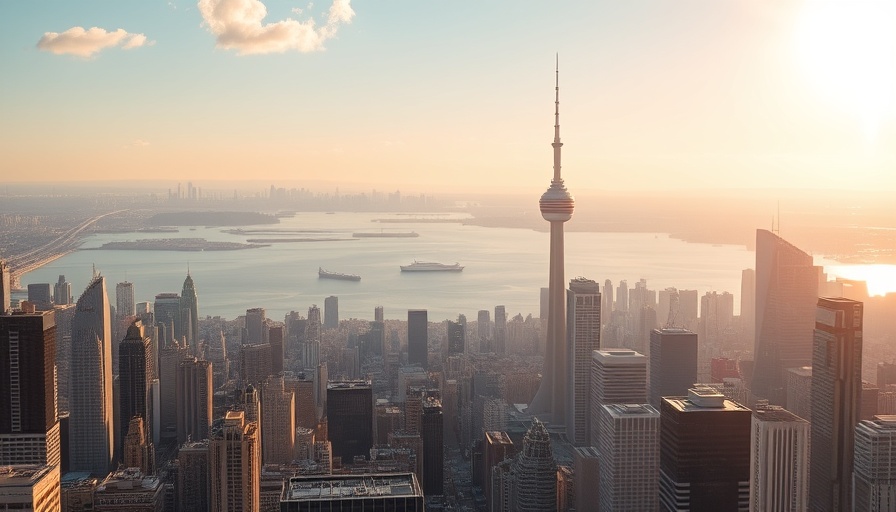
A New Era of Urban Living: The Importance of Choosing the Right City
As we explore the evolving criteria for global livability, the need for a well-rounded urban experience has never been more essential. Amid the complexities that encompass stability, healthcare, and cultural vibrancy, potential movers are increasingly aware of how their environments can impact their day-to-day life. Today, a serious consideration of lifestyle choices leads many to scan the globe for ideal destinations to plant roots. With dreams sparked by palm-fringed beaches, vibrant coffee shops, and well-funded public services, individuals are aspiring to enhance their lives through relocation.
Understanding the Global Liveability Index: How It Shapes Our Choices
The recently released Global Liveability Index by the Economist Intelligence Unit evaluates 172 cities based on a formulaic approach, encompassing five key categories: Stability, Healthcare, Culture & Entertainment, Education, and Infrastructure. The 2025 report featured an overall average livability score of 76.1, applying valuable metrics as guideposts for anyone considering an international move.
Changes to stability scores, driven substantially by global unrest and other pressing issues, highlight the volatile nature of urban living. Still, improvements in healthcare and education reflect a continued push for better quality of life in many regions, showcasing how cities are evolving in response to global challenges.
The Top 10 Most Livable Cities of 2025: A Global Snapshot
With a closer look at the rankings, cities across Western Europe, Oceania, Canada, and Japan emerged as the most favorable living environments. In an unprecedented shake-up, one city managed to dethrone Vienna, which had reign supreme for several years. This year, no US cities ranked in this elite list, with the highest domestic city being Honolulu at #23.
Here’s a closer look at the 10 best places to live globally in 2025:
- 1. Melbourne, Australia (Overall Rating: 97.5) - Renowned for its cultural diversity and excellent public services, Melbourne has topped the chart for the first time, highlighting its credentials as a vibrant metropolis.
- 2. Vienna, Austria (Overall Rating: 97.4) - Long known for its artistic heritage and historic charm, Vienna continues to be a prime choice for those seeking a cultured lifestyle.
- 3. Sydney, Australia (Overall Rating: 97.3) - With its beautiful harbor and outdoor lifestyle, Sydney remains an attractive option.
- 4. Vancouver, Canada (Overall Rating: 95.8) - Despite a minor dip in ranking, Vancouver continues to impress with its blend of urban life and natural beauty.
- 5. Toronto, Canada (Overall Rating: 95.7) - As a melting pot of cultures, Toronto enriches the living experience with diverse culinary experiences and artistic venues.
- 6. Copenhagen, Denmark (Overall Rating: 92.9) - Known for its sustainable practices, Copenhagen is a model for modern living.
- 7. Calgary, Canada (Overall Rating: 90.8) - Calgary’s spacious parks and commitment to environmental sustainability keep it high on the livability list.
- 8. Osaka, Japan (Overall Rating: 90.5) - Osaka's unique cultural scene and culinary offerings appeal to those seeking adventure.
- 9. Auckland, New Zealand (Overall Rating: 89.9) - With its breathtaking landscapes and welcoming communities, Auckland is a haven for outdoor enthusiasms.
- 10. Brussels, Belgium (Overall Rating: 89.6) - As a hub of international diplomacy, Brussels marries historic charm with cosmopolitan flair.
Counterarguments to the Rankings: Diverse Perspectives
While the Global Liveability Index provides a solid framework, viewers must consider alternative perspectives on what defines livability. Issues such as economic opportunities, local government effectiveness, and community engagement also play crucial roles. Some critics argue that the Index overly emphasizes safety and public health without a thorough evaluation of cultural richness, affordability, or regional employment prospects.
Personal experiences shared by those living in these globally ranked cities can shed light on both the pros and cons associated with each location. Engaging with local communities often fosters deeper insights than what data alone can provide.
Real-Life Experiences: A Day in the Life in the Best Cities
Imagine enjoying a morning coffee while overlooking the iconic Sydney Opera House, or immersing yourself in the hustle of Vienna's unique coffee culture. The quality of daily life in these cities is deeply influenced by their cultural setups, connectedness to nature, and regional amenities. Many residents tout that moving to these cities has offered them more than just a home; it provided enriching experiences that significantly shaped their outlook on life.
Practical Tips for a Successful Move
For adventurers contemplating relocation to one of these cities, consider leveraging digital resources and local networks to facilitate your search for housing and employment. Make use of social media forums for expats in different cities—they can often share invaluable advice on negotiating visa regulations, settling in, and making connections in an unfamiliar environment.
Moreover, investing time in local language learning can significantly enhance integration experiences as well. With a little effort and resourcefulness, the transition can be both rewarding and fulfilling, offering the life you’ve always dreamed of.
The Future of Urban Living: What Lies Ahead?
As the world grapples with challenges like climate change, urbanization, and evolving job landscapes, our choices in where to live will also shift. By understanding the factors that influence livability, we can better navigate the journey of relocation, ensuring that our next step will lead us to a place that not only checks all the boxes but elevates our quality of life.
Exploring ideal cities is not just about dreaming; it is about seeking a future that resonates with personal aspirations in harmony with the environment we engage with.
 Add Row
Add Row  Add
Add 




Write A Comment